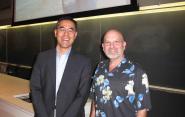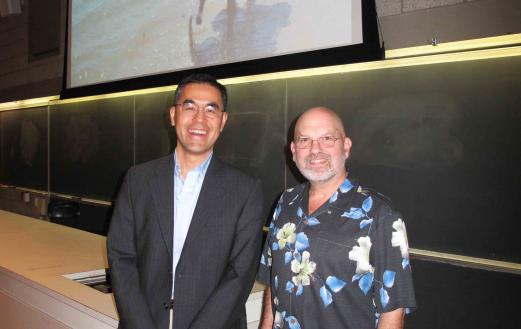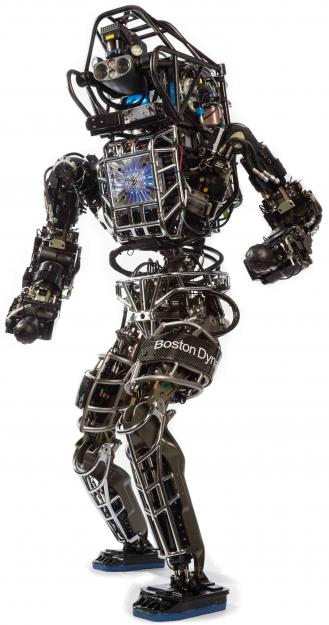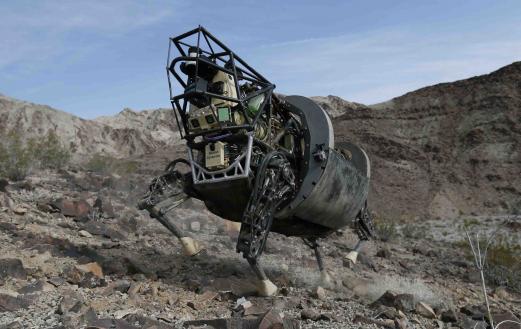'Father of Walking Robots' Presents 2014 Nyquist Lecture

“Our motto is simple: build it, break it, fix it,” said noted roboticist Marc Raibert during a campus talk on Nov. 20 to a packed audience in Davies Auditorium.

Raibert—founder of world-renowned robotics company Boston Dynamics and “father of walking robots”—visited the Yale School of Engineering & Applied Science as speaker for the 2014 Nyquist Lecture in Electrical Engineering. Highlighting technology advancements spearheaded by Boston Dynamics, Raibert spoke about the past, present, and future robotics technology.
Inspired by animal and human capabilities and biomechanics, the robots presented were built over the the past two decades to meet the task-based challenges of running, climbing, jumping, and even gymnastic maneuvers. For example, the company’s “Atlas” is a highly mobile humanoid robot built for the DARPA Robotics Challenge, a competition that will require the robot to walk bipedally over outdoor, rough terrain; moreover, Atlas’s upper limbs—including a robotic hand designed by Aaron Dollar, the John J. Lee Associate Professor of Mechanical Engineering & Materials Science—can be used to lift, carry, and manipulate the environment, in addition to driving a vehicle, climbing ladders using hands and feet, and operating power tools.

But solutions for these complex tasks, said Raibert, begin with simple models: “I love simple models. For example, I am an inverted pendulum, with an upper body mass and a point of support in my feet—when I walk, I’m not trying to stabilize myself all the time, but am managing the tipping motion that’s inherent to this simple model. As roboticists, our job is to take the simple rules for how an inverted pendulum tips, then design a controller that goes with the flow of that and plans the tipping.”
Raibert added, however, that future of robotics may not lie in simple models, suggesting that a better robot may someday be produced using only equations, optimizations, and learning processes—something that could theoretically be done without the designer even knowing anything about the system. “On the other hand,” he said, “today, these simple models are still very powerful and help us get new systems implemented quickly with high function, while optimizations play a smaller role.”
While discussing BigDog and AlphaDog—four-legged robots that can walk, run, climb, and carry heavy loads even up slopes and across rubble, snow, and muddy trails—Raibert provided a similar perspective on the future of robotic vision. “If you have a long enough time horizon, vision will be essential to how a robot works,” he said. “But if you want to make a reliable machine sooner, then simpler sensors might be a better choice, even though they won’t allow all the capability.”
Raibert supported that perspective by showing how Boston Dynamics, which was acquired by Google in 2013, has begun incorporating vision into some of their robots' capabilities while still ensuring that the machines' base level of functionality remains “immune to the frailties of the vision.” This layered system, he said, has more functionality today than his robots would if his company committed entirely to relying on vision.

Raibert concluded his presentation by showing film clips of humorous errors and crashes his robots have undergone throughout their development, which underscored how he believes the robots of today can be refined and improved to become the robots of tomorrow. “We don’t try to build the perfect robot the first time out,” he said, “but instead try to get something out there, try to go and experiment and see what works and what doesn’t work. Then we just have to be prepared to fix what doesn’t work. We have fun breaking it, and we have fun fixing it.”
Named in honor of Harry Nyquist, Ph.D. ’17, an important contributor to stability theory and information theory through his research into a quantitative understanding of thermal noise, data transmission and negative feedback, the Nyquist Lectureship is made possible through a generous gift from J. Robert Mann, Jr., B.E. ’51, Chairman and CEO of E-J Electric Installation Co., founded in 1899. Mann is the sponsor of the J. Robert Mann, Jr., Yale Engineering Student Center and a recipient of the Yale Medal, Yale’s highest award to honor outstanding individual service to the University.

